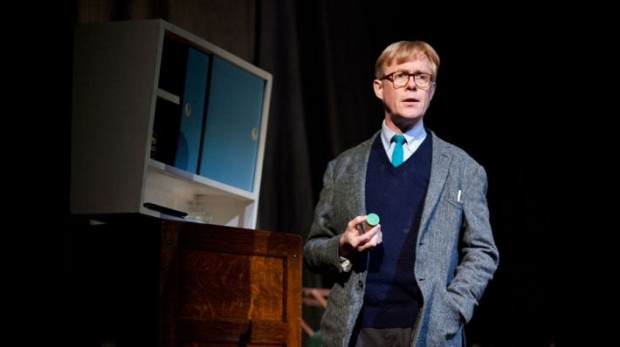You have no items in your cart. Want to get some nice things?
Go shopping
Alan Bennett has had more mileage from his childhood and northern upbringing than most writers of his generation. Many of his countless books, radio diaries, and plays rake through the details of his early life with a fine-tooth comb. And yet, as Bennett returns again and again to these subjects with such charm and witty intelligence, it seems we can’t help but continue to relish his arch recollections with unabashed joy. Despite being fictive, there is a raw, melancholic reality in Bennett’s plays which is immediately evocative of a kind of nostalgic Britishness, his words staying with you long after you’ve left the theatre.
I am, it has to be said, a self-confessed Bennett enthusiast. I went to see the History Boys so many times when it was originally staged at the National Theatre that at one point I actually quoted lines from the play in an interview to study History at Oxford (out of sheer desperation – needless to say I didn’t get in!). So it was with absolute pleasure that I scooted off to the Duchess Theatre in the West End to see Bennett’s latest theatrical offering, fresh from its run at the National Theatre.
Untold Stories combines two plays: Hymn and Cocktail Sticks, directed by Nadia Hall and Nicholas Hytner respectively; the latter having just announced he will soon be stepping down as Director of the National Theatre. Both plays are taken from Bennett’s autobiographical writings of his early life, set to music by George Fenton. In Hymn, the more original of the two pieces, Bennett recalls his father’s interest in music and his own reflections on music that have stayed with him throughout his life. This monologue is set alongside a quartet on the stage that marvelously play off Bennett’s own musings. With a much larger cast, Cocktail Sticks focuses on Bennett’s parents, particularly his mother’s notions of respectability and the eponymous 1970s cocktail party.
If, like me, you like Bennett then this production is really a charming pleasure in its meandering witty cleverness. If you don’t then this could feel a little slow, but Fenton’s score, with the sublime musicians on stage, should certainly entertain you. Bennett’s script moves quickly between the self-reflexive sneer at his mother’s social aspirations, to certain backhanded comments and word play. Both plays can’t help but make you smile. The whole audience was shaking with laughter during Cocktail Sticks, with his recollections of his Mam and Dad (brilliantly played by Gabrielle Lloyd and Jeff Rawle), only to be quickly moved to tears by the deadpan staging of his mother slowly moving into dementia.
At the centre of both is Bennett himself, played by Alex Jennings, bespectacled and tweed clad. As a character that we all feel we know so well, it might be said that Bennett has crafted a persona so vivid that no one can take him off as well as he could himself. He certainly riffs with his own caricature throughout both of these plays. Jennings, fills the role with a light touch and ironic finesse, his voice so uncanny of Bennett that, when I first went to see Hymn at the National last year, a friend of mine actually thought that it was the real Alan Bennett on stage. He also brings such an intimacy to both plays, which makes this smaller theatre the perfect venue – I would say even more so than a larger stage at the National.
Although this is a play from and about Bennett himself, the spectre of Richard Griffith’s recent death seemed to loom over this opening night. He had been at the centre of so many of Bennett’s plays, particularly in his portrayal of Hector in the History Boys. Indeed Hector’s immortal lines “famished for antiquity”, are evoked in Cocktail Sticks, perfectly summing up Bennett’s own humoured dissatisfaction with childhood. And just like his childhood reminiscences in the long-running Telling Tales (which I listened to on cassette tapes on long car journeys throughout my own childhood), there is something so special in having Bennett’s world brought to life, acted out on the stage.
I urge you to go and see these two plays from one of Britain’s greatest living playwrights. The ultimate storyteller, Bennett’s life has become something akin to a historical object in itself, which in the retelling becomes ever more poignant. This is what theatre does so well, and what Bennett so artfully invokes: the stories from a life, recast and replayed again and again. As Hector so immortally pronounces at the end of The History Boys, “Pass the parcel, that’s sometimes all you can do. Take it, feel it, and pass it on. Not for me. Not for you. But for someone. Somewhere. One day. Pass it on, boys, that’s the game I wanted you to learn. Pass it on.” And so he does.
Alan Bennett’s Untold Stories is on at the Duchess Theatre, Covent Garden, until June 2013.

About Bea Moyes
Bea is currently studying for an MRes at the London Consortium, Birkbeck. She is a writer and researcher involved in exploring the poetics and cultural history of urban spaces, with a particular passion for yarnbombing and temporary street installations. Until summer 2012 Bea was director and curator of short stories at the digital publisher Ether Books and has worked with a number of publishers as well as for literary publicists and magazines.




